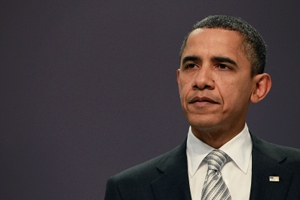Government & Politics
AU Experts: Obama Faces Tough Term

It’s tough out there for a second-term president.
Recession and the U-2 spy plane disaster marred Dwight Eisenhower’s second spin as commander-in-chief. Richard Nixon resigned after the Watergate scandal. Ronald Reagan lost control of the Senate in the wake of the Iran-Contra affair. Bill Clinton was impeached and George W. Bush failed to execute campaign proposals on Social Security and immigration.
If history is any guide, President Barack Obama has a rough road ahead of him, AU’s presidential experts say.
“I don’t believe in curses, but second terms have been historically difficult,” said Allan Lichtman, distinguished professor of history. “All of the second-term presidents of the recent past have had trouble accomplishing anything.”
Obama, who was inaugurated on Monday, has significant challenges ahead of him — a divided Congress, a slow recovering economy, and unfolding fiscal issues. Plus, there’s the harsh reality that second-term presidents in modern elections have the stage for a limited time before the political focus shifts to future races.
PHOTOS: View Top Images of AU at Inauguration 2013
“All eyes are on him for a year,” said Patrick Griffin, adjunct professorial lecturer in the Department of Government. “But as soon as it turns to the mid-term elections, Obama will have a tough time making good on the remainder of his campaign promises.”
The ‘Lame Duck’ Challenges Ahead
White House second terms have often been disappointments not only for the electorate, but also for the victor. Few presidents have fared well, Lichtman said.
First, the president is a lame duck. He won’t be running for reelection, so political operatives gain little by hitching their wagons to an outgoing president. There is also nothing to prevent adversaries from attacking with impunity.
Second, Lichtman said, most second-term presidents have run out of ideas. They have offered all of their best ideas in the first-term, leaving the second-term to push secondary initiatives.
Lichtman points to Reagan’s second term as an example. Were it not for an overhaul of the tax code and a nuclear arms treaty with Mikhail Gorbachev, Reagan's second term would have been unremarkable.
The third reason why many a second-term president’s star dims is because often the legislators are not on the president’s side. A divided Congress like the one Obama is facing can make passing legislation a Sisyphean task.
“Obama has to deal with a sharply right-wing House that doesn’t agree with him on anything,” Lichtman said.
Griffin, who is the academic director of the Public Affairs and Advocacy Institute for the Center for Congressional and Presidential Studies, echoes Lichtman — “Obstructionist has become the new norm.”
But not everyone takes a negative view of Obama’s next term. Anita McBride, an executive in residence in the Department of Government, thinks this second term could be one of opportunities rather than setbacks.
“There’s a chance in a second term to take a refreshed approach to the work and to finish some of the major policy priorities of the first term,” she said.
Rather than viewing Obama as a lame duck weakened by a political timetable and an unyielding Republican Party, McBride, a White House veteran, takes a more positive view. The president has nothing to lose, she said.
“That is a position of strength. The president is the only one who can take the helm and rise above it,” McBride said. “He can reach across the aisle, but you haven’t necessarily seen that yet. There’s been more of a digging in of heels.”
Addressing the Nation’s Issues
Obama’s second turn as president didn’t start out on the best foot. There was the fiscal cliff crisis, which was mostly averted. Now there is the debt ceiling, sequestration and other financial woes.
These debates over taxes and spending are overshadowing what Lichtman views as larger issues facing the U.S., including immigration, gun control, and climate change. However, if the country’s financial problems can be dispatched early in the second term, Obama may yet have some political capital to get work done on the issues he campaigned on.
“Obama won the popular vote and I think the administration will make an attempt on these big issues,” McBride said. “His win in November invited the opportunity to be successful on those issues.”
Though McBride cautions that if Obama’s attempts at affecting change on big concerns flounder, there will likely be serious repercussions. Passing any legislation will be more difficult.
In addition to the campaign issues, Obama is also likely thinking about succession in his second term. Winning three successive terms has been hard for both parties and hasn’t happened since 1988 when George Bush followed Ronald Reagan. But the victory was short-lived — Democrats regained the White House when Clinton beat Bush in 1992.
Lichtman says the Democrats have a good chance of retaining control over the presidency because “the Republicans are on the wrong side of demography.”
But McBride believes the president needs to focus on the problems the country is facing now rather than securing his legacy.
“He has to see the big picture and bring a level of maturity to the office,” she said. “This isn’t about winning elections anymore.”
